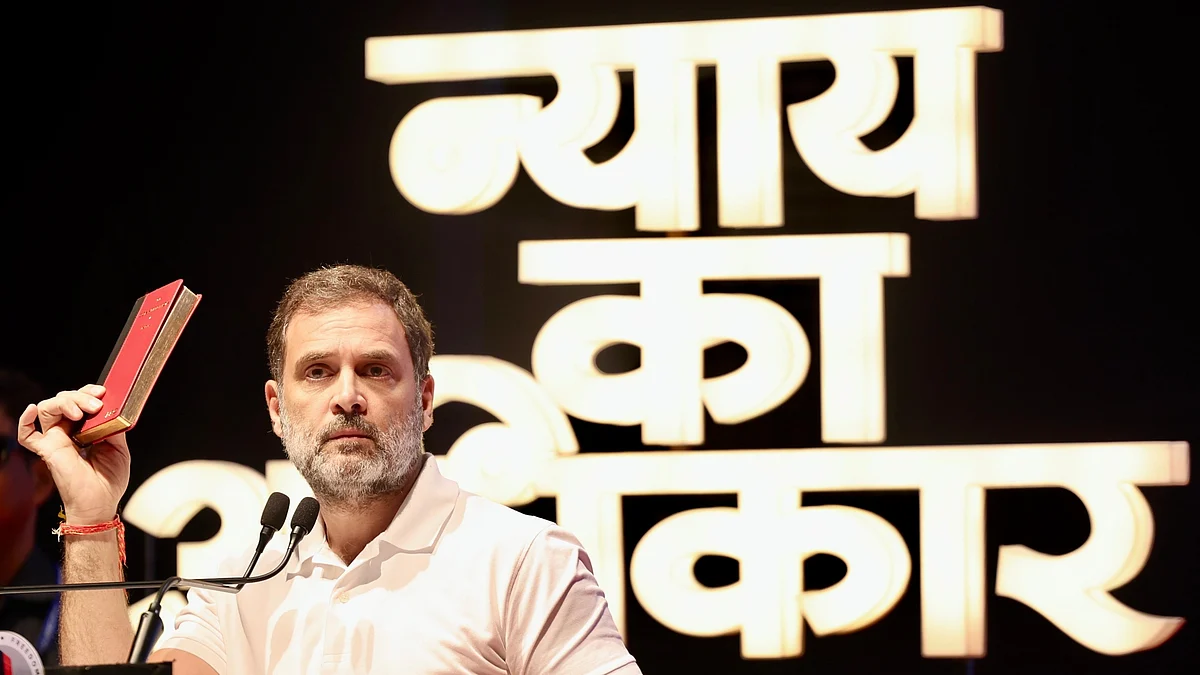Maharashtra polls: Rahul Gandhi launches campaign, pledges caste census
Says over 90 per cent of the country's marginalised populations would benefit from such a measure

Congress MP and Lok Sabha leader of Opposition Rahul Gandhi launched his party’s campaign in Maharashtra on Wednesday, with a firm pledge to implement a caste census in India if his party gains power.
Addressing the 'Samvidhan Samman Sammelan' in Nagpur, Maharashtra, Gandhi said the caste census is crucial to expose the systemic inequities faced by Dalits, OBCs, and Adivasis and to drive reforms that ensure fair representation and justice for marginalised communities.
"The caste census will lay bare the distribution of power," Gandhi said, emphasising that the exercise would reveal the share of resources and influence held by various communities.
"People need to understand who wields power and what roles different groups play," he added. Gandhi further criticised the current 50 per cent reservation cap, stating, "We will break that 50 per cent wall."
Positioning the caste census as a new model for social development, Gandhi remarked that over 90 per cent of the country's marginalised populations would benefit from such a measure. “We have to tell the nation that we are fighting for justice for these communities," he asserted.
In his speech, Gandhi also defended the Constitution as envisioned by Dr B.R. Ambedkar, saying it represents more than a set of laws; it is a commitment to equality. “For the BJP and RSS, attacking the Constitution is an attempt to stifle the voices of millions of Indians," he said.
Rahul Gandhi paid floral tributes at the statue of Lord Buddha at Nagpur’s Deekshabhoomi, the renowned Buddhist stupa where Dr Ambedkar embraced Buddhism.
Highlighting disparities in India's corporate sector, Gandhi pointed out the absence of Dalits, OBCs, and Adivasis in top management positions, especially in prominent conglomerates.
"You won’t find a single Dalit, OBC, or Adivasi in Adani's management,” he said, taking a direct jab at the perceived corporate favoritism. Gandhi also criticised the government’s decision to waive Rs 16 lakh crore in debts for a select few while showing reluctance to address farmers' debt. “When I speak for farmers’ loan waivers, I’m told it spoils habits, yet they write off debts for billionaires,” he said.
The ongoing assembly polls in Maharashtra mark another crucial test for alliances and caste dynamics as national parties and regional alliances vie for control of one of India’s most politically influential states.
Historically, Maharashtra elections have been a high-stakes contest between the BJP and the Congress, with regional players like the Shiv Sena and the NCP influencing coalition dynamics.
In the last Assembly elections in 2019, the BJP emerged as the largest party but failed to secure a majority on its own. The Shiv Sena then led by Uddhav Thackery formed the government with the help of Congress and NCP as part of the MVA.
A major political upheaval reshaped the state’s governance when Eknath Shinde, a senior Shiv Sena leader, led a significant split within the Shiv Sena, taking with him a sizeable faction of party MLAs. Supported by the BJP, Shinde orchestrated a change in power dynamics, ultimately toppling the MVA government.
With the BJP's backing, Shinde was sworn in as chief minister of Maharashtra under the Mahayuti (grand alliance) banner, a coalition that marked the Shiv Sena’s return to its former ally. The BJP's Devendra Fadnavis, a former chief minister, assumed the role of deputy chief minister, solidifying the BJP-Shiv Sena alliance in its new form. This political shift underscored the volatile nature of Maharashtra politics.
As Maharashtra heads to the polls, the Mahayuti alliance — comprising Shinde’s Shiv Sena faction and the BJP — is gearing up for a high-stakes contest. Shinde’s Shiv Sena will be contesting 80 seats, while the BJP has staked its claim on 148, reflecting the strategic seat-sharing arrangement within the alliance.
Observers note that Gandhi’s push for a caste census has struck a chord with various communities, drawing significant traction and sparking discussions about representation and social justice. However, analysts caution that while the census is a compelling issue, the Opposition still faces substantial challenges in its efforts to unseat the ruling coalition. Winning over voters will require a multi-pronged strategy and a united front to counter the established influence of the Mahayuti government and its incumbents.
Follow us on: Facebook, Twitter, Google News, Instagram
Join our official telegram channel (@nationalherald) and stay updated with the latest headlines